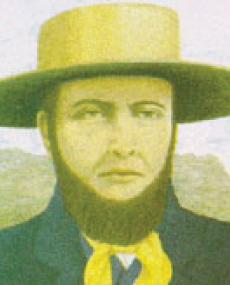
Andries Hendrik Potgieter was born in the Graaff Reinet district in the Cape Colony on the 19th of December 1792. He was the second child of Petronella Margaretha and Hermanus Potgieter.
He fought in the Fourth and Fifth Frontier Wars and was a wealthy sheep farmer when, like many other Dutch farmers at the Cape, he decided to leave the colony in 1834. In 1835 a group of Voortrekkers left the colony under his leadership. His departure had been delayed by the Sixth Frontier War.
Potgieter moved inland to the northern Free State where he developed cordial relationships with local Black leaders who were hiding from Mzilikazi. One of these leaders, Makwena, exchanged some land between the Vet and Vaal Rivers for 49 cattle and protection from Potgieter.
During this time Potgieter explored the surrounding area and travelled as far as one days riding to Zimbabwe. He returned to the Vaal River in 1836 and heard of Matabele attacks on Voortrekkers. He delayed his plans to migrate further north in order to punish these offences. At a Voortrekker meeting on 2 December 1836 he was elected as the Chief Commandant. By 1837 Mzilikazi and his Matabele were completely removed from the western Transvaal. In 1838 more Voortrekkers were attacked in Natal and Potgieter went to their aid. This time he suffered a severe loss when his forces were drawn into an ambush. The Natal frontiersmen blamed him for the incident. He was deeply offended and left the region and moved on to found the town of Potchefstroom in what is the North West Province today.
In the 1840s the British took control of Natal, but Potgieter refused to become part of the British Empire and Potchefstroom broke away from the Natal. He decided to establish the new Boer republic of Transvaal. Potgieter also developed an interest in Delagoa Bay as an avenue to the rest of the world. He visited the port city in 1843 and was welcomed by the Portuguese colonisers in the area. This, the advice of several of his Dutch friends and his desire to live beyond the 25th degree of latitude caused him to move closer to the Mozambique border.
In 1848 Sir Harry Smith annexed the Orange Free State and Andries Pretorius, Potgieter's rival, gathered a commando to help the Free State Boers regain their freedom. Potgieter was criticised for his lack of involvement and he decided to travel to Potchefstroom to fight for the Transvaal's independence. He had talks with Smith's representative in the Vaal River, Richard Southey, and they reached an agreement that the area north of the Vaal would be left alone.
Due to his commitments elsewhere Potgieter was not present when his trek to the northern parts of the Transvaal began. Jan Valentyn Botha acted as temporary leader and led the group to settle near the Soutpansberg and founded a town that was to become Schoemansdal. Voortrekker communities were spread far apart and it became clear that Boer leaders had to unite and work together under one government or Volksraad to guarantee the safety and well-being of the Voortrekkers all over South Africa.
Potgieter settled in the far north after the meeting to cement the new Voortrekker unity took place. He did not take an active part in politics because he was so far away. This gave Pretorius the opportunity to take the lead with Potgieter's support.
Although he was still relatively young Potgieter had lived a dangerous life, which eventually took its toll on his health. He died at Schoemansdal on 16 December 1852. He had been a recognised and charismatic military leader.